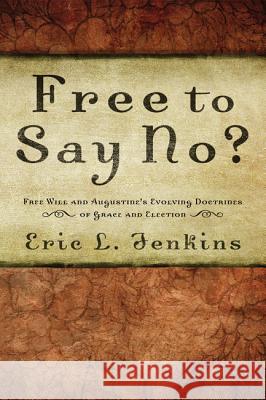Free to Say No?: Free Will and Augustine's Evolving Doctrines of Grace and Election » książka
Free to Say No?: Free Will and Augustine's Evolving Doctrines of Grace and Election
ISBN-13: 9781620322253 / Angielski / Miękka / 2012 / 146 str.
Free to Say No?: Free Will and Augustine's Evolving Doctrines of Grace and Election
ISBN-13: 9781620322253 / Angielski / Miękka / 2012 / 146 str.
(netto: 83,26 VAT: 5%)
Najniższa cena z 30 dni: 87,18
ok. 16-18 dni roboczych
Dostawa w 2026 r.
Darmowa dostawa!
Synopsis: For centuries Augustine's theory of free will has been used to explain why God is not the author of evil and humans are morally responsible for sin. Yet, when he embraced the doctrines of unconditional election and operative grace, Augustine began modifying his theory of free will. His final works claim his evolved notion of free will remained consistent with his early view, but this claim has provoked significant debate. Some scholars take him at his word, interpreting his teachings on free will in light of his later predestination teachings. Others reject his claim of continuity and warn of great inconsistencies between his early and later works. Few have undertaken a thorough study of Augustine's works to compare his early notion of free will with his later theory of predestination. Free To Say No? is a detailed study of Augustine's work that presents clear evidence in Augustine's own words for a significant discontinuity between his early and later theories--especially the disappearance of the will's freedom to say "No"--and offers some fascinating insights as to why Augustine proposed such drastic changes. Author Biography: Eric L. Jenkins (MPhil, London School of Theology) has been a missionary for twenty years, including serving as the Director of a Bible School in Algeria--the land of Augustine.
Synopsis:For centuries Augustines theory of free will has been used to explain why God is not the author of evil and humans are morally responsible for sin. Yet, when he embraced the doctrines of unconditional election and operative grace, Augustine began modifying his theory of free will. His final works claim his evolved notion of free will remained consistent with his early view, but this claim has provoked significant debate. Some scholars take him at his word, interpreting his teachings on free will in light of his later predestination teachings. Others reject his claim of continuity and warn of great inconsistencies between his early and later works. Few have undertaken a thorough study of Augustines works to compare his early notion of free will with his later theory of predestination. Free To Say No? is a detailed study of Augustines work that presents clear evidence in Augustines own words for a significant discontinuity between his early and later theories--especially the disappearance of the wills freedom to say "No"--and offers some fascinating insights as to why Augustine proposed such drastic changes.Author Biography:Eric L. Jenkins (MPhil, London School of Theology) has been a missionary for twenty years, including serving as the Director of a Bible School in Algeria--the land of Augustine.











